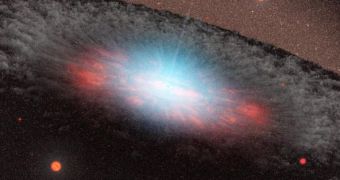The concept of entropy refers to a quantity used to measure chaos. Entropy has been on the rise in the Universe ever since the Big Bang, and a new scientific study, taking into account the latest astronomical data, has evidenced that massive black holes at the center of galaxies are the largest contributors to this increase. This may not seem like much, but astrophysicists say that the higher the entropy, the faster the Cosmos' end will come. The correlation, in their mind, is simple and direct. Details of the idea have been submitted for publication in an upcoming issue of The Astrophysical Journal, NewScientist reports.
In charge of the new investigation were experts Chas Egan and Charles Lineweaver, from the Australian National University, in Canberra. They used the most recent data to calculate the entropy of everything in the Universe, from clouds of cosmic dust and gas to gravitons – the hypothetical elementary particles that create the force of gravity within the framework of the quantum-field theory. Out of all the structures they analyzed, regardless of their sizes, behemoth black holes were found to be the largest contributors to entropy increase of all known space objects.
Entropy is also sometimes used to express the number of possible arrangements of matter and energy that may exist within an object. Finding this number in relation to most things is fairly easy, but, when it comes to black holes, everything is suddenly turned upside-down. The internal state of a black hole is still a subject of speculation, as there is currently no way of probing its insides and returning data to an observer. In the recent study, it was revealed that everything in the observable Universe contained about 10,104 units of entropy, as measured in Joules per Kelvin.
These figures are by a factor of 10 to 1,000 times higher than previous estimates of entropy, conducted without taking into account the role that supermassive black holes played in the process. “Our results suggest we're a little further along that road than previously thought,” Egan explains. Still, there is hope, University of Oregon physicist Stephen Hsu says. He argues that the black holes have little to bring to the table in terms of influencing the flows of heat that circulate throughout the Universe, and even out the temperatures within.

 14 DAY TRIAL //
14 DAY TRIAL //